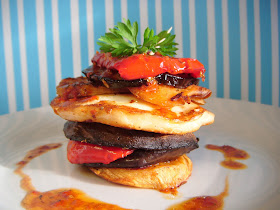 |
| © |
Serves 4
For the stacks:
- 1 large aubergine, sliced thickly
- 1 large courgette, cut in half and then sliced into strips
- 2 large bell peppers, deseeded and cut into quarters
- 1 large sweet potato or baking potato, peeled and sliced thickly
- 4 large, flat mushrooms, de-stalked
- 200g halloumi cheese, sliced thickly
For the peri-peri/piri-piri sauce:
- 1-2 large red chillis - grated* or finely chopped
- 1 large lemon or 2 limes, juiced
- 2 tbsp olive oil
- 1 clove of garlic, crushed
- 1 tsp sweet paprika powder
- 1 tsp dried oregano
Make up the peri-peri sauce, by mixing the ingredients together in a small bowl.
Brush the vegetables and halloumi cheese slices liberally with olive oil and either fry, grill or barbecue them in batches until soft and golden brown; Cook the sweet potato/potato and aubergine slices first as they take longer to cook.
Keep them warm in the oven (on a baking tray) until all the ingredients have been cooked.
Drizzle the vegetables and cheese with half of the peri-peri sauce and return to the oven for 5 minutes.
Stack the vegetables and cheese slices on four plates.
Drizzle the remaining sauce around each stack.
Skewer with a cocktail stick and top with a sprig of parsley.
Serve with home made bread or mini roasted potatoes and salad.
Not suitable for freezing.
*Top tip: Freeze the chilli and then grate on a fine grater from the pointy end. Once you get to the seeds at the stalk end, discard the chilli.
Vegan Option: Either omit the halloumi cheese or swap for vegan cheese or firm, drained and fried tofu (marinate tofu in some of the peri-peri sauce before frying).
Brush the vegetables and halloumi cheese slices liberally with olive oil and either fry, grill or barbecue them in batches until soft and golden brown; Cook the sweet potato/potato and aubergine slices first as they take longer to cook.
Keep them warm in the oven (on a baking tray) until all the ingredients have been cooked.
Drizzle the vegetables and cheese with half of the peri-peri sauce and return to the oven for 5 minutes.
Stack the vegetables and cheese slices on four plates.
Drizzle the remaining sauce around each stack.
Skewer with a cocktail stick and top with a sprig of parsley.
Serve with home made bread or mini roasted potatoes and salad.
Not suitable for freezing.
*Top tip: Freeze the chilli and then grate on a fine grater from the pointy end. Once you get to the seeds at the stalk end, discard the chilli.
Vegan Option: Either omit the halloumi cheese or swap for vegan cheese or firm, drained and fried tofu (marinate tofu in some of the peri-peri sauce before frying).




